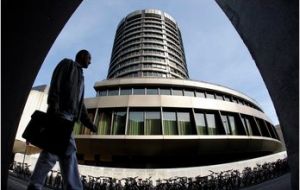MercoPress. South Atlantic News Agency
World’s 29 biggest banks need to raise 566bn dollars of common equity by 2019
 The Bank for International Settlements is seeking to implement rules to prevent taxpayers being forced to rescue failing banks
The Bank for International Settlements is seeking to implement rules to prevent taxpayers being forced to rescue failing banks The world’s biggest banks may have to raise about 566 billion dollars of common equity to meet rules on capital to be implemented by 2019, curtailing shareholder returns, according to analysts at Fitch Ratings.
The sum needed by the 29 global banks that regulators deem too big to fail is equivalent to about 23% of the lenders’ current 2.5 trillion of aggregate common equity, according to a report by analysts led by Martin Hansen in New York. The median lender could meet the requirements with three years of retained earnings, according to Fitch.
International banking regulators meeting under the aegis of the Bank for International Settlements in Basel are seeking to implement rules to prevent taxpayers being forced to rescue failing banks. As well as boosting capital requirements, they are instituting rules on leverage ratios and funding to ensure lenders can withstand future crises.
“There’s a shortfall and we wanted to see what covering that implies,” Hansen said. The new rules, known as Basel III, “create incentives to reduce expenses further and to increase pricing pressure on borrowers and customers where feasible,” he said.
The banks named as global systemically important financial institutions, which have to hold a special capital surcharge of between 1% and 2.5% of assets weighted by risk, include Deutsche Bank AG , the four largest U.K. banks, Bank of America Corp. and Goldman Sachs Group Inc. (GS)
They are likely to reduce their holdings of more volatile, lower-rated assets, potentially increasing borrowing costs of weaker companies and reducing availability of credit to them, according to the report. Securities of such borrowers would become harder to trade and companies may be forced to borrow from less regulated lenders such as private equity firms and hedge funds, according to a Fitch report, called “Basel III: Return and De-leveraging Pressures.”
“If banks decide to originate risk and then pass it on to outsiders then it adds to the stability of the banking system,” said Hansen. “Risk hasn’t been reduced, though -- it’s been moved from one part of the system to another.”
The median return on equity of the 29 lenders, which was 7.3% last year and averaged 11% between 2005 and 2011, will fall to 8.5% to 9% as the banks seek to make up the capital shortfall, according to Hansen.
Some institutions may see a competitive advantage stemming from their systemic status and the likelihood they would be rescued in crisis, because they would have lower funding costs and may be able to lure business away from competitors. Others might see it as a “regulatory burden” and seek to limit their size and complexity to escape the designation, according to the report.




Top Comments
Disclaimer & comment rules-

-

-

Read all commentsCorralito????????????????
May 19th, 2012 - 03:16 pm 0The International Narcotics Control Strategy Report published by the US State Department moved Argentina down from the 'Countries of Concern' category. According to the report numerous observers, both international and from with Argentina have said that the country's financial system is a site for laundering money from drugs trafficking, corruption and contraband.
May 20th, 2012 - 04:44 pm 0@Brit Bob
May 20th, 2012 - 08:50 pm 0You forgot about Russian missiles and plutonium sales.
Commenting for this story is now closed.
If you have a Facebook account, become a fan and comment on our Facebook Page!